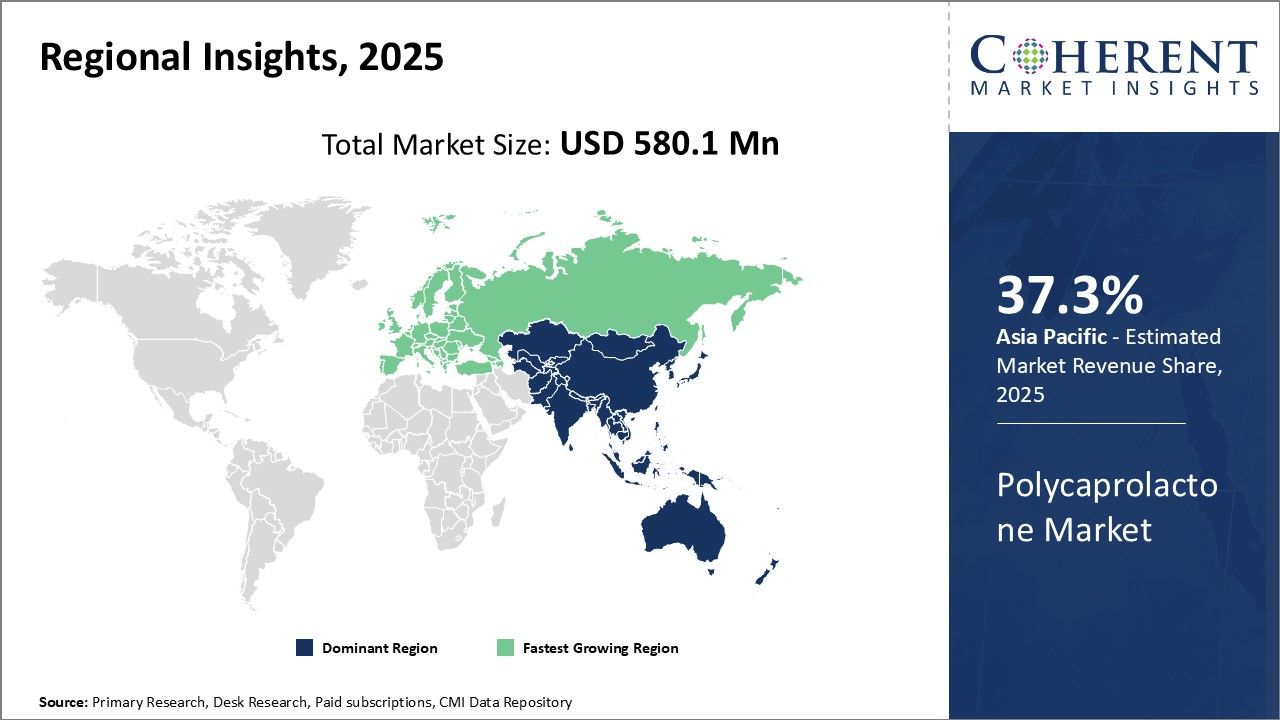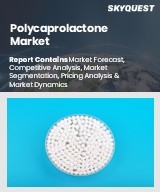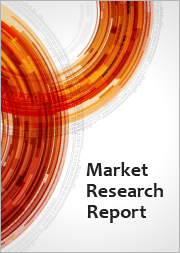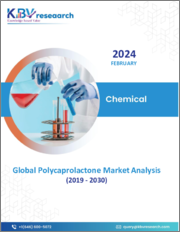
|
시장보고서
상품코드
1673041
폴리카프로락톤 시장 : 폼 유형별, 등급별, 용도별, 지역별Polycaprolactone Market, By Form Type, By Grade, By Application, By Geography |
||||||
폴리카프로락톤 세계 시장은 2025년에 5억 8,010만 달러, 2032년에는 10억 8,870만 달러에 달할 것으로 예상되며, 2025년부터 2032년까지 9.4%의 연평균 복합 성장률(CAGR)을 보일 전망입니다.
| 보고 범위 | 보고서 상세 내용 | ||
|---|---|---|---|
| 기준 연도 | 2024년 | 2025년 시장 규모 | 5억 8,010만 달러 |
| 실적 데이터 | 2020-2024년 | 예측 기간 | 2025-2032년 |
| 예측 기간(2025-2032년) CAGR | 9.40% | 2032년 가치 예측 | 10억 8,870만 달러 |

폴리카프로락톤은 ε-카프로락톤 유래의 생분해성 열가소성 폴리에스테르입니다. 임플란트, 봉합사, 비계 등 생체의료 부품의 제조에 널리 사용되며, PCL은 생체적합성, 연성, 가공성이 우수합니다. 체내에 삽입되면 에스테르 결합의 가수분해에 의해 서서히 분해되어 이산화탄소와 물로 대사되어 배출됩니다. 느린 분해 과정을 통해 시간이 지남에 따라 새로운 조직이 재생됩니다. 또한, PCL은 유리전이 온도가 낮고 섭씨 60도 전후에서 녹기 때문에 용제 주조, 섬유 방사, 3D 프린팅 등 다양한 기술에 의한 가공에 적합합니다. 생분해성과 생체적합성 특성으로 인해 PCL은 헬스케어, 제약, 포장 산업에서 응용되고 있습니다.
시장 역학
임플란트, 봉합사, 비계 등 생체의료용도에 대한 헬스케어 분야 수요 증가는 폴리카프로락톤 시장의 성장을 가속할 수 있습니다. 플라스틱 오염 증가와 비생분해성 폴리머에 대한 엄격한 규제는 PCL과 같은 생분해성 대체 재료에 성장 기회를 제공할 수 있습니다. 원재료의 용이성, 제조 인프라가 구축되어 있는 것이 시장 성장의 원동력이 될 것입니다. 그러나 기존 폴리머에 비해 높은 제조비용은 시장 성장에 걸림돌이 될 수 있습니다. 생분해성 옵션으로 전환하기 위해서는 기존 제조 공정의 변경이 필요하며, 이는 시장 성장에 걸림돌이 될 수 있습니다.
본 조사의 주요 특징
폴리카프로락톤(Polycaprolactone) 세계 시장을 상세하게 분석했으며, 2024년을 기준 연도로 하여 예측 기간(2025-2032년) 시장 규모(USD Mn)와 연평균 복합 성장률(CAGR)을 조사하여 전해드립니다.
또한, 다양한 부문에 걸친 잠재적 수익 기회를 밝히고, 이 시장의 매력적인 투자 제안 매트릭스를 설명합니다.
또한 시장 성장 촉진요인, 억제요인, 기회, 신제품 출시 및 승인, 시장 동향, 지역별 전망, 주요 기업의 경쟁 전략 등에 대한 중요한 고찰을 제공합니다.
폴리카프로락톤 세계 시장에서의 주요 기업 프로파일을 기업 하이라이트, 제품 포트폴리오, 주요 하이라이트, 실적, 전략 등의 파라미터를 기반으로 제공합니다.
조사 대상 주요 기업으로는 Perstorp Holding AB,BASF SE,Daicel Corporation,Sigma-Aldrich(Merck KGaA),Durect Corporation,Corbion Purac,Shenzhen Esun Industrial Co.Ltd,Haihang Industries Co.Ltd,Polyscienes, Inc.,SABIC,3M Company,Asahi Kasei Chemicals Corporation,Solvay,Sumitomo Chemical Co. Holdings BV 등이 있습니다.
이 보고서의 통찰력을 통해 마케팅 담당자와 기업 경영진은 향후 제품 출시, 유형화, 시장 확대, 마케팅 전략에 대한 정보에 입각한 의사결정을 내릴 수 있습니다.
폴리카프로락톤 세계 시장 보고서는 투자자, 공급업체, 제품 제조업체, 유통업체, 신규 시장 진출기업, 재무 분석가 등 다양한 이해관계자를 대상으로 합니다.
이해관계자들은 세계 폴리카프로락톤 시장 분석에 사용되는 다양한 전략 매트릭스를 통해 의사결정을 쉽게 내릴 수 있습니다.
목차
제1장 조사 목적과 전제조건
- 조사 목적
- 전제조건
- 약어
제2장 시장 전망
- 보고서 설명
- 시장 정의와 범위
- 주요 요약
- Coherent Opportunity Map(COM)
제3장 시장 역학, 규제, 동향 분석
- 시장 역학
- 성장 촉진요인
- 성장 억제요인
- PEST 분석
- PORTER Five Forces 분석
- 시장 기회
- 규제 시나리오
- 주요 발전
- 업계 동향
제4장 세계의 폴리카프로락톤 시장 - 코로나바이러스(COVID-19) 팬데믹의 영향
- 세계의 폴리카프로락톤 시장에 영향을 미치는 요인-COVID-19
- 영향 분석
제5장 세계의 폴리카프로락톤 시장, 형태별, 2020년-2032년
- 펠릿/과립
- 마이크로스피어
제6장 세계의 폴리카프로락톤 시장, 등급별, 2020년-2032년
- 고분자량 PCL
- 저분자량 PCL
제7장 세계의 폴리카프로락톤 시장, 용도별, 2020년-2032년
- 약물전달 시스템
- 조직공학
- 생분해성 포장
- 3D 프린팅
- 코팅제 및 접착제
제8장 세계의 폴리카프로락톤 시장, 지역별, 2020년-2032년
- 북미
- 라틴아메리카
- 유럽
- 아시아태평양
- 중동
- 아프리카
제9장 경쟁 구도
- 히트맵 분석
- 시장 점유율 분석(3x3 매트릭스)
- 기업 개요
- Perstorp Holding AB
- BASF SE
- Daicel Corporation
- Sigma-Aldrich(Merck KGaA)
- Durect Corporation
- Corbion Purac
- Shenzhen Esun Industrial Co., Ltd
- Haihang Industries Co., Ltd
- Polyscienes, Inc.
- SABIC
- 3M Company
- Asahi Kasei Chemicals Corporation
- Solvay
- Sumitomo Chemical Co., Ltd
- LyondellBasell Industries Holdings BV
제10장 애널리스트 추천 사항
- 기회
- 애널리스트의 견해
- Coherent Opportunity Map
제11장 섹션
- 참고 문헌
- 조사 방법
Global Polycaprolactone Market is estimated to be valued at USD 580.1 Mn in 2025 and is expected to reach USD 1,088.7 Mn by 2032, growing at a compound annual growth rate (CAGR) of 9.4% from 2025 to 2032.
| Report Coverage | Report Details | ||
|---|---|---|---|
| Base Year: | 2024 | Market Size in 2025: | USD 580.1 Mn |
| Historical Data for: | 2020 To 2024 | Forecast Period: | 2025 To 2032 |
| Forecast Period 2025 to 2032 CAGR: | 9.40% | 2032 Value Projection: | USD 1,088.7 Mn |

Polycaprolactone is a biodegradable thermoplastic polyester derived from epsilon-caprolactone. It is widely used to manufacture biomedical components such as implants, sutures and scaffolds. PCL has good biocompatibility, ductility and processability. When implanted in the body, it degrades gradually through hydrolysis of its ester linkages and gets metabolized or eliminated as carbon dioxide and water. The slow degradation process allows new tissue to regenerate over time. PCL also has low glass transition temperature and melts at around 60 degrees Celsius, making it compatible for processing through various techniques such as solvent casting, fibre spinning, 3D printing, and others. Owing to its biodegradable and biocompatible properties, PCL finds applications in healthcare, pharmaceutical and packaging industries.
Market Dynamics
Growing demand from the healthcare sector for biomedical applications like implants, sutures, and scaffolds can drive the polycaprolactone market growth. Rising plastic pollution and stringent regulations against non-biodegradable polymers can offer growth opportunities for biodegradable alternatives like PCL. Easy availability of raw materials and established manufacturing infrastructure can drive the market growth. However, high production costs as compared to conventional polymers can hamper the market growth. Switching to biodegradable options require changes in established manufacturing processes, and this can hamper the market growth.
Key features of the study
This report provides in-depth analysis of the global polycaprolactone market, and provides market size (USD Mn) and compound annual growth rate (CAGR%) for the forecast period (2025-2032), considering 2024 as the base year
It elucidates potential revenue opportunities across different segments and explains attractive investment proposition matrices for this market
This study also provides key insights about market drivers, restraints, opportunities, new product launches or approval, market trends, regional outlook, and competitive strategies adopted by key players
It profiles key players in the global polycaprolactone market based on the following parameters - company highlights, products portfolio, key highlights, financial performance, and strategies
Key companies covered as a part of this study include Perstorp Holding AB, BASF SE, Daicel Corporation, Sigma-Aldrich (Merck KGaA), Durect Corporation, Corbion Purac, Shenzhen Esun Industrial Co., Ltd, Haihang Industries Co., Ltd, Polyscienes, Inc., SABIC, 3M Company, Asahi Kasei Chemicals Corporation, Solvay, Sumitomo Chemical Co., Ltd, and LyondellBasell Industries Holdings BV
Insights from this report would allow marketers and the management authorities of the companies to make informed decisions regarding their future product launches, type up-gradation, market expansion, and marketing tactics
Global polycaprolactone market report caters to various stakeholders in this industry including investors, suppliers, product manufacturers, distributors, new entrants, and financial analysts
Stakeholders would have ease in decision-making through various strategy matrices used in analyzing the global polycaprolactone market
Market Segmentation
- Form Type Insights (Revenue, USD Mn, 2019 - 2032)
- Pellets/Granules
- Microspheres
- Grade Insights (Revenue, USD Mn, 2019 - 2032)
- High Molecular Weight PCL
- Low Molecular Weight PCL
- Application Insights (Revenue, USD Mn, 2019 - 2032)
- Drug Delivery Systems
- Tissue Engineering
- Biodegradable Packaging
- 3D Printing
- Coatings and Adhesives
- Regional Insights (Revenue, USD Mn, 2019 - 2032)
- North America
- U.S.
- Canada
- Latin America
- Brazil
- Argentina
- Mexico
- Rest of Latin America
- Europe
- Germany
- U.K.
- Spain
- France
- Italy
- Russia
- Rest of Europe
- Asia Pacific
- China
- India
- Japan
- Australia
- South Korea
- ASEAN
- Rest of Asia Pacific
- Middle East
- GCC Countries
- Israel
- Rest of Middle East
- Africa
- South Africa
- North Africa
- Central Africa
- Key Players Insights
- Perstorp Holding AB
- BASF SE
- Daicel Corporation
- Sigma-Aldrich (Merck KGaA)
- Durect Corporation
- Corbion Purac
- Shenzhen Esun Industrial Co., Ltd
- Haihang Industries Co., Ltd
- Polyscienes, Inc.
- SABIC
- 3M Company
- Asahi Kasei Chemicals Corporation
- Solvay
- Sumitomo Chemical Co., Ltd
- LyondellBasell Industries Holdings BV
Table of Contents
1. Research Objectives and Assumptions
- Research Objectives
- Assumptions
- Abbreviations
2. Market Purview
- Report Description
- Market Definition and Scope
- Executive Summary
- Market Snippet, By Form Type
- Market Snippet, By Grade
- Market Snippet, By Application
- Market Snippet, By Region
- Coherent Opportunity Map (COM)
3. Market Dynamics, Regulations, and Trends Analysis
- Market Dynamics
- Drivers
- Restraints
- PEST Analysis
- PORTER's Five Forces Analysis
- Market Opportunities
- Regulatory Scenario
- Key Developments
- Industry Trend
4. Global Polycaprolactone Market - Impact of Coronavirus (COVID-19) Pandemic
- Overview
- Factors Affecting the Global Polycaprolactone Market - COVID-19
- Impact Analysis
5. Global Polycaprolactone Market, By Form Type, 2020-2032, (USD Mn)
- Introduction
- Market Share Analysis, 2025, 2028, and 2032 (%)
- Y-o-Y Growth Analysis, 2021 - 2032
- Segment Trends
- Pellets/Granules
- Market Share Analysis, 2025, 2028, and 2032 (%)
- Y-o-Y Growth Analysis, 2021 - 2032
- Segment Trends
- Microspheres
- Market Share Analysis, 2025, 2028, and 2032 (%)
- Y-o-Y Growth Analysis, 2021 - 2032
- Segment Trends
6. Global Polycaprolactone Market, By Grade, 2020-2032, (USD Mn)
- Introduction
- Market Share Analysis, 2025, 2028, and 2032 (%)
- Y-o-Y Growth Analysis, 2021 - 2032
- Segment Trends
- High Molecular Weight PCL
- Market Share Analysis, 2025, 2028, and 2032 (%)
- Y-o-Y Growth Analysis, 2021 - 2032
- Segment Trends
- Low Molecular Weight PCL
- Market Share Analysis, 2025, 2028, and 2032 (%)
- Y-o-Y Growth Analysis, 2021 - 2032
- Segment Trends
7. Global Polycaprolactone Market, By Application, 2020-2032, (USD Mn)
- Introduction
- Market Share Analysis, 2025, 2028, and 2032 (%)
- Y-o-Y Growth Analysis, 2021 - 2032
- Segment Trends
- Drug Delivery Systems
- Market Share Analysis, 2025, 2028, and 2032 (%)
- Y-o-Y Growth Analysis, 2021 - 2032
- Segment Trends
- Tissue Engineering
- Market Share Analysis, 2025, 2028, and 2032 (%)
- Y-o-Y Growth Analysis, 2021 - 2032
- Segment Trends
- Biodegradable Packaging
- Market Share Analysis, 2025, 2028, and 2032 (%)
- Y-o-Y Growth Analysis, 2021 - 2032
- Segment Trends
- 3D Printing
- Market Share Analysis, 2025, 2028, and 2032 (%)
- Y-o-Y Growth Analysis, 2021 - 2032
- Segment Trends
- Coatings and Adhesives
- Market Share Analysis, 2025, 2028, and 2032 (%)
- Y-o-Y Growth Analysis, 2021 - 2032
- Segment Trends
8. Global Polycaprolactone Market, By Region, 2020-2032, (USD Mn)
- Introduction
- Market Share Analysis, By Region, 2025, 2028, and 2032 (%)
- Y-o-Y Growth Analysis, For Region, 2021 - 2032
- North America
- Market Share Analysis, By Country, 2025, 2028 and 2032 (%)
- Y-o-Y Growth Analysis, For Country, 2021 - 2032
- Market Size and Forecast, By Form Type, 2020- 2032, (USD Mn)
- Market Size and Forecast, By Grade, 2020- 2032, (USD Mn)
- Market Size and Forecast, By Application, 2020- 2032, (USD Mn)
- Market Size and Forecast, By Country, 2020- 2032, (USD Mn)
- U.S.
- Canada
- Latin America
- Market Share Analysis, By Country, 2025, 2028 and 2032 (%)
- Y-o-Y Growth Analysis, For Country, 2021 - 2032
- Market Size and Forecast, By Form Type, 2020- 2032, (USD Mn)
- Market Size and Forecast, By Grade, 2020- 2032, (USD Mn)
- Market Size and Forecast, By Application, 2020- 2032, (USD Mn)
- Market Size and Forecast, By Country, 2020- 2032, (USD Mn)
- Brazil
- Argentina
- Mexico
- Rest of Latin America
- Europe
- Market Share Analysis, By Country, 2025, 2028 and 2032 (%)
- Y-o-Y Growth Analysis, For Country, 2021 - 2032
- Market Size and Forecast, By Form Type, 2020- 2032, (USD Mn)
- Market Size and Forecast, By Grade, 2020- 2032, (USD Mn)
- Market Size and Forecast, By Application, 2020- 2032, (USD Mn)
- Market Size and Forecast, By Country, 2020- 2032, (USD Mn)
- U.K.
- Germany
- Italy
- France
- Spain
- Russia
- Rest of Europe
- Asia Pacific
- Market Share Analysis, By Country, 2025, 2028 and 2032 (%)
- Y-o-Y Growth Analysis, For Country, 2021 - 2032
- Market Size and Forecast, By Form Type, 2020- 2032, (USD Mn)
- Market Size and Forecast, By Grade, 2020- 2032, (USD Mn)
- Market Size and Forecast, By Application, 2020- 2032, (USD Mn)
- Market Size and Forecast, By Country, 2020- 2032, (USD Mn)
- China
- India
- Japan
- ASEAN
- Australia
- South Korea
- Rest of Asia Pacific
- Middle East
- Market Share Analysis, By Country, 2025, 2028 and 2032 (%)
- Y-o-Y Growth Analysis, For Country, 2021 - 2032
- Market Size and Forecast, By Form Type, 2020- 2032, (USD Mn)
- Market Size and Forecast, By Grade, 2020- 2032, (USD Mn)
- Market Size and Forecast, By Application, 2020- 2032, (USD Mn)
- Market Size and Forecast, By Country, 2020- 2032, (USD Mn)
- GCC Countries
- Israel
- Rest of Middle East
- Africa
- Market Share Analysis, By Country/Region, 2025, 2028 and 2032 (%)
- Y-o-Y Growth Analysis, For Country/Region, 2021 - 2032
- Market Size and Forecast, By Form Type, 2020- 2032, (USD Mn)
- Market Size and Forecast, By Grade, 2020- 2032, (USD Mn)
- Market Size and Forecast, By Application, 2020- 2032, (USD Mn)
- Market Size and Forecast, By Country/Region, 2020- 2032, (USD Mn)
- South Africa
- North Africa
- Central Africa
9. Competitive Landscape
- Heat Map Analysis
- Market Share Analysis (3x3 Matrix)
- Company Profiles
- Perstorp Holding AB
- Company Overview
- Product Type Portfolio
- Recent Developments/Updates
- BASF SE
- Company Overview
- Product Type Portfolio
- Recent Developments/Updates
- Daicel Corporation
- Company Overview
- Product Type Portfolio
- Recent Developments/Updates
- Sigma-Aldrich (Merck KGaA)
- Company Overview
- Product Type Portfolio
- Recent Developments/Updates
- Durect Corporation
- Company Overview
- Product Type Portfolio
- Recent Developments/Updates
- Corbion Purac
- Company Overview
- Product Type Portfolio
- Recent Developments/Updates
- Shenzhen Esun Industrial Co., Ltd
- Company Overview
- Product Type Portfolio
- Recent Developments/Updates
- Haihang Industries Co., Ltd
- Company Overview
- Product Type Portfolio
- Recent Developments/Updates
- Polyscienes, Inc.
- Company Overview
- Product Type Portfolio
- Recent Developments/Updates
- SABIC
- Company Overview
- Product Type Portfolio
- Recent Developments/Updates
- 3M Company
- Company Overview
- Product Type Portfolio
- Recent Developments/Updates
- Asahi Kasei Chemicals Corporation
- Company Overview
- Product Type Portfolio
- Recent Developments/Updates
- Solvay
- Company Overview
- Product Type Portfolio
- Recent Developments/Updates
- Sumitomo Chemical Co., Ltd
- Company Overview
- Product Type Portfolio
- Recent Developments/Updates
- LyondellBasell Industries Holdings BV
- Company Overview
- Product Type Portfolio
- Recent Developments/Updates
- Perstorp Holding AB
10. Analyst Recommendation
- Wheel of Fortune
- Analyst View
- Coherent Opportunity Map
11. Section
- References
- Research Methodology
- About Us and Sales Contact



















